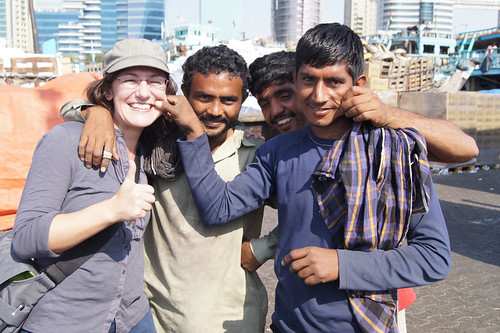When Dubai was being built up, only about a decade ago, I was totally smitten. It was thrilling to see so many creative buildings and over-the-top plans implemented in one place.
But I only got around to going to Dubai this year, on a stopover to Bangkok. After the whole project started to creep me out a little bit. After I’d read a few exposes about labor practices, and after the gloss of an indoor ski slope wore off, and it just seemed hubristic and wrong.
The first indication that we were in an odd place was in the immigration line, when we realized that the random guys in snow-white robes and starched headdresses walking around were actually officials, as were the guys in robes at the desks. Why they got to walk around in their everyday Emirati clothes, and not in any kind of uniform, only dawned on me later.
Then we marched over to the metro. Or we tried to. We got lost and wound up in a bus bay, and I asked a driver where the metro was. First I tried asking in Arabic, and then realized how dumb that was. The guy was Indian, and told us in perfect English where to get the metro. At the metro, more people told us in perfect English how the system worked. It’s the first time I’ve been in an Arab country where my Arabic was utterly useless.
The next day, we zipped all over the place on the metro—or really, just back and forth, as it’s really only one very long, perfectly straight line. At each stop, I noticed there was always one very bored man in a white robe sloping around.
And then I finally saw a woman make a beeline up to one of these guys and ask him a question. Ohhhhh. The robe was the uniform. That’s how you, if you were a native Dubai-ite, or an Arab of any kind, could know who spoke Arabic. Poor guy had nothing to do in general, but every so often, he had to fend off a cranky person waving a metro card and complaining.
We went to the mall, and saw the same thing. Each info desk was staffed with four polyglot, global-looking people, and one guy in a robe. And the head-to-toe black-clad super-glam shopper-ladies, with their black hijabs piled up high over giant, towering bouffant hairdos (oh, how I love this look!) and their gold trickling down their wrists and their lavish black eyeliner—these ladies knew exactly who to ask for directions to the frozen-yogurt store.
Only once in our admittedly short visit did we ever naturally interact with a native Dubai resident. It was one of those guys on token-Arab duty in the metro, who busted Peter for not having put enough money on our cards.
And why would we have such an interaction? Full Dubai citizens are the upper-upper class, and the rest of the country is filled with guest workers who handle all the tedious stuff, like interacting with tourists. It’s the normal travel situation—in which you meet all kinds of taxi drivers, hotel clerks and tea-sellers, but never your peers—thrown into sharp relief.
Peter and I tried to buck the system. We ignored his brother’s advice not to walk around (“Yes, you don’t want to live there. Don’t fight it. Cabs are cheap.”) and set off on foot from our hotel. The weather was balmy, but podlike air-conditioned bus shelters hinted at a more terrifying climate. We walked along wide boulevards lined with faceless buildings, every window tinted or mirrored to keep out the blazing sun. (“Here’s a cliché for the guidebooks,” Peter snickered. “‘In Dubai, even the buildings are veiled.'”)
We wound up at the docks, lined with dhows. I had just read a lot about them in Tim Mackintosh-Smith’s book Yemen: The Unknown Arabia, and was delighted to see these grand wooden ships in person, looking like they’d just sailed in from the fourteenth century, fresh from a trading jaunt across the Indian Ocean. Now they were getting loaded up with tires, bags of rice and innumerable boxes stamped “Made in China.”
No one spoke Arabic here, either. These men were from Bangladesh. We were the most interesting thing they’d seen all day.
So were my breasts, apparently. Cheek-squeezing devolved into a clumsy boob-grab. (If only boob-grabbers knew what they were doing! But by definition, a boob-grabber has no experience with boobs. Getting fondled on the street used to make me feel preyed upon and victimized; now it just makes me feel sorry for the dudes.)
We hopped a boat across the “creek,” the little river that flows through the oldest part of Dubai. We meant to take an old-fashioned one, where you’re hanging inches above the water and holding yourself up as if you’re a straphanger on the subway. But instead we wound up on a proper posh city-run boat.
(to be continued…)





I just laughed out loud at your boobgrabbers definition. So very very true.
I don’t know if you read anything about this in your research, but the Jewel of Muscat was a great project dealing with some of the Medieval trade routes through the Gulf. Archaeologists made a replica of a 9th century Arab ship that was excavated in Singapore and sailed it all the way from Oman back to Singapore last spring- http://www.jewelofmuscat.tv/
So cool, Marta–thanks for the tip!
And Klary, I feel proud.